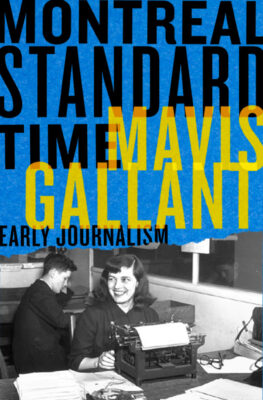I have been griping about the state of the media ever since I emerged from journalism school as a hopeless baby writer. There have been some positives, like the burst of online journalism that spawned a new generation of creative writers. But I would be lying if I said I remembered any bylines from peak Gawker. Long gone are the days when journalism was a guaranteed stepping stone for great writers – like Mavis Gallant.

Montreal Standard Time
The Early Journalism of Mavis Gallant
Mavis Gallant
Véhicule Press
$29.95
paper
306pp
9781550656701
Covering a wide range of topics, from labour rights and agricultural resettlement to visual art and jazz, this book will appeal to an equally diverse readership. Canadian and Montreal history nerds, journalism fans (especially those nostalgic for its golden years), and the literary crowd familiar with Gallant’s straightforward prose and killer wit are all bound to find something to love amid these 38 articles.
Standouts will vary based on your interests, but I love when Gallant is at her most merciless, wielding wit and humour to uncover wrongdoings. In “Why Are We Canadians So Dull?,” Gallant mocks her countrymen in a satirical piece bemoaning the dearth of support for creative Canadians. “Silliest situation of all is the way Canadians get violent over Americanization yet nine times out of ten won’t buy, read, or listen to a home-grown product,” she writes in 1946. In “Bachelors Aren’t All Eligible”, she bites back at articles instructing women on how to be good wives. “We felt our psychiatrist had overlooked one thing about bachelors — namely women. If they ever did marry, they would have to marry women. There isn’t much choice. So we artfully put the question: ‘Do you like women, as such?’”
Gallant also artfully straddled the so-called “Two Solitudes” in a way I can appreciate as a confused bilingual who has to explain who Ginette Reno is. Fluent in French, she wrote about cultural figures who were important in French Canada, including Gabrielle Roy and Roger Lemelin.
Then there are Gallant’s pieces investigating the problems of post-war Canada. Articles like “Don’t Call Me War Bride” and “DP Test Case: A Failure” focus on immigration, hiding none of Gallant’s disdain for Canada’s policies. Her criticisms are often still valid, as in “Are They Canadians?,” which exposes the lack of support for immigrants from Canada’s government and people. She writes: “It accounts for the extraordinary hyphenated Canadianism which still exists. A third-generation Ukrainian will still be called just that, though he may never have seen his family’s native land and may never want to.”
What Beesner, Dvorák, and Richardson have created with this book is an ingenious time capsule of a city and country as experienced through the smart, empathetic, and feminist viewpoint of Mavis Gallant. Not to embody the stereotype of a nearly middle-aged person waxing on about the good ol’ days, but it’s hard to imagine how our present will be as immaculately preserved for future generations when our news is mainly consumed as viral memes. Gallant referred to journalism as her “apprenticeship” during which she learnt how to observe the world around her. Beyond serving as a showcase for Gallant’s early writings and budding voice, this book is a great reminder on the importance of nurturing strong voices that report and comment on what’s happening on a local and national level.mRb






0 Comments